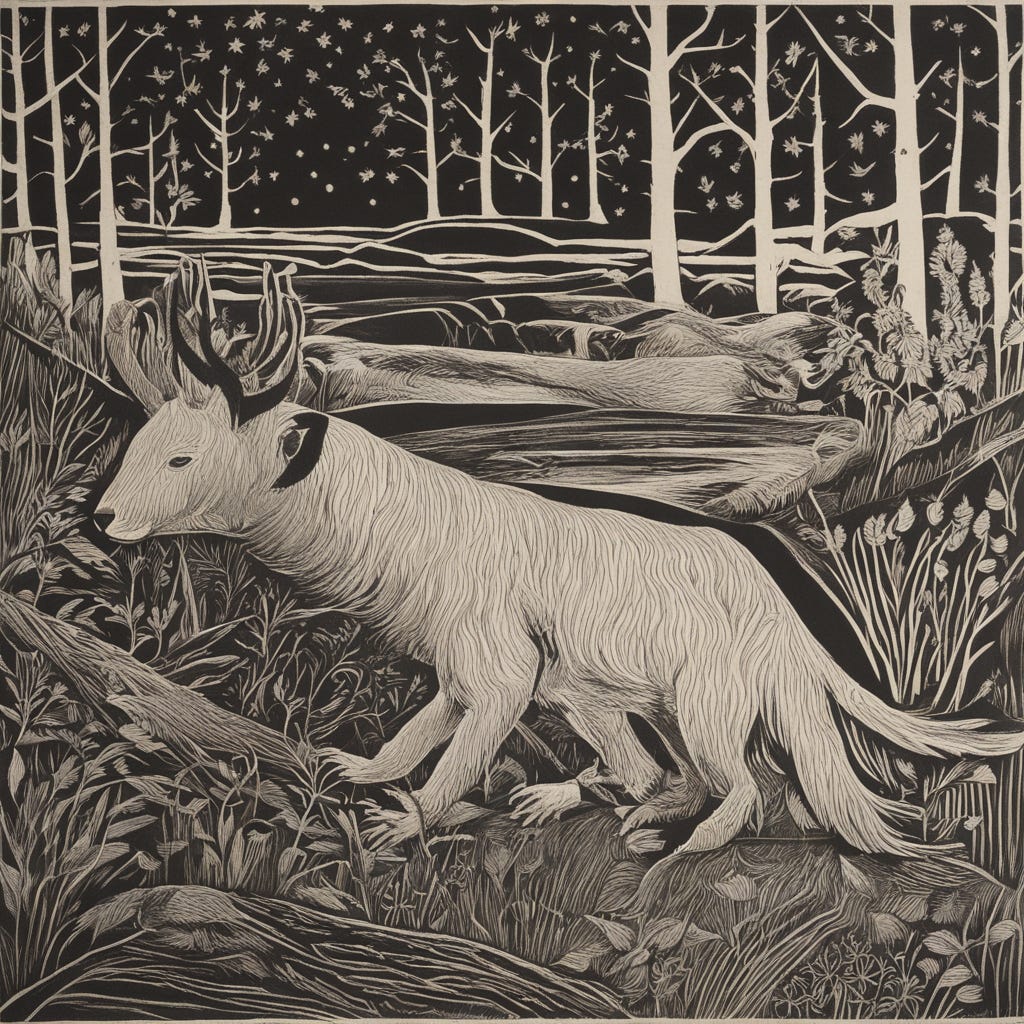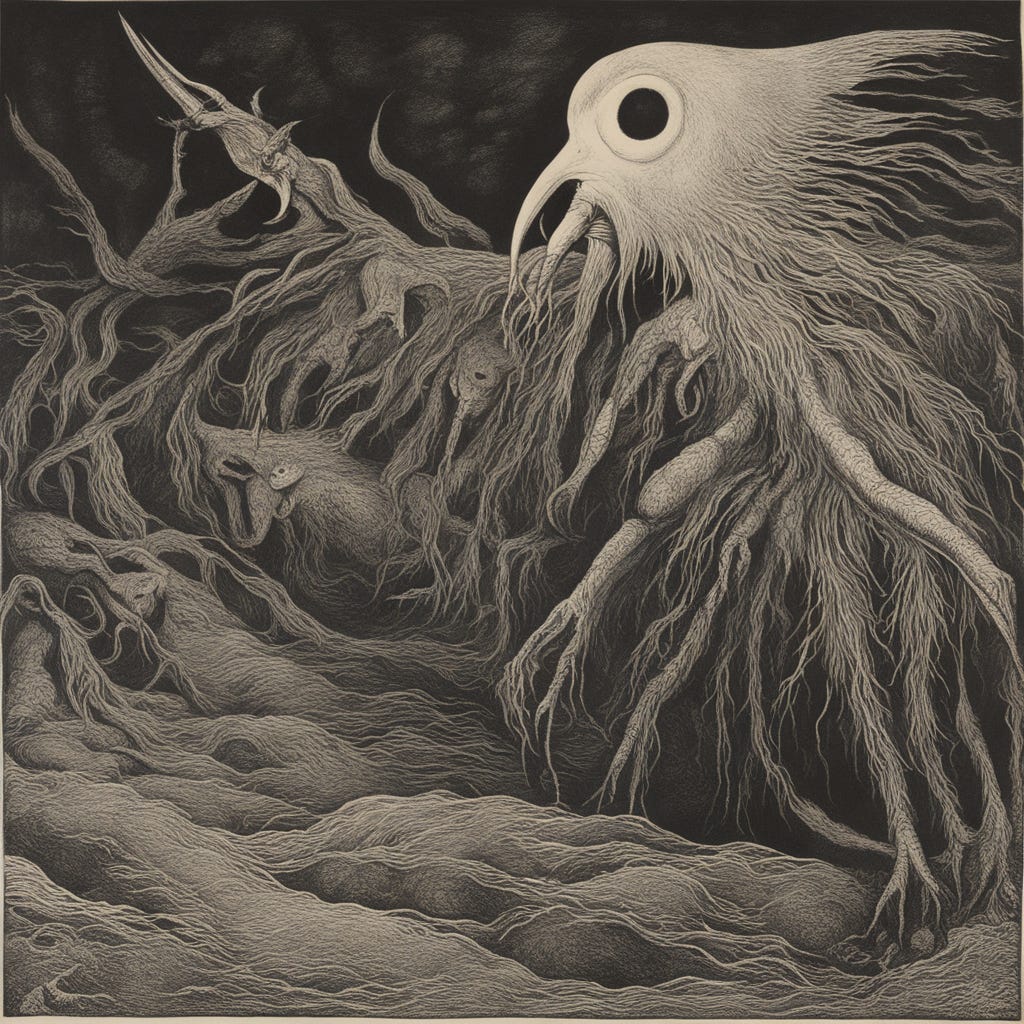The Sernox
or, an automyth
Child or adult, all sate its need,
For when you sleep deeply, it comes out to feed.
—Scandinavian folklore
During the second year of my postgraduate I won a mildly prestigious travel grant, offering a sort of gap year of additional study. Had I been asked afterward—and if I’d been honest—I would have admitted the only reason I’d applied was in the hope of delaying what I felt was an increasingly incompatible choice of degree. But I wasn’t honest. Not to anyone. Certainly not to myself.
I’d applied on a whim, the type of application that, once pushed under my nose, sort of wrote itself. Not difficult, not easy, but an in-between my mind slotted into. After stapling the pages together, inserting them into an envelope and sending them on their flattened way, I stood next to the blood-red post box on an empty Nottinghamshire street and looked up at a gunmetal sky. I could feel it. I could sense it. Clotho’s unspooling thread caught between my fingers as I pinched fate’s silken fibres.
It was one of several moments in my life when I simply knew.
The grant offered a choice of two destinations: an institute somewhere on the coast of Spain (I forget where, so let’s go with Valencia), or the expanse of Finland. Obviously I went for Finland. It’s not as though Spain would have been a bad choice, it’s just … well, Finland. The Northern Lights. Forests. Lakes. The best scenery on the planet. I didn’t know where in Finland… OK, so that’s not quite true; had I cared, I could have found out. It was probably on the form. I didn’t care, though. I didn’t question anything.
The intention of the travel grant—what it was that I was meant to be doing—is something I don’t want to talk about, in part because I didn’t really do the stuff (like I said, I wasn’t honest; not back then), but also because it’s not important. It’s inconsequential to events beyond funnelling my life in a certain direction.
As it turned out, I flew to Helsinki and spent several days at the university in the company of some such person responsible for running the academic scheme I found myself within. I don’t remember their name. It was a long time ago. Mikael, possibly. They led me around, introduced me to others, took me to lunches and dinners and made sure I was looked after. It was a formality, but a respectful one. I doubt I showed possibly-Mikael much respect in return. In my idiotic and naïve youth, I was filled with a roguish arrogance that makes me flinch when I think back on it. That person, that being who through time’s erosion no longer resides in the body that sits here hunched over a keyboard … I find it hard to remember what that creature was and whether it, the former me, was even real. I think that's why I want to write about it. Maybe. Or maybe it’s only a way to write about what happened.
The university was merely a stop-gap—a place for me to find my feet, get adjusted, meet some of the people I was meant to meet. After those first days of orientation I took a long train ride north to a small village where I would spend half a year engaging in, on paper at least, field work and research. (As I said, I don’t want to talk about what that entailed.) Numerous others were there as part of the same group, doing the same thing—all from various cities across Finland or parts of Scandinavia, with me the only one from England—and there were enough of us to give the place a strange glimmer of the artificial. The locals eyed us with suspicion. With distaste. Their skin emitted a constant unease.
The village was perhaps two hundred people. Its name meant something like Fish Lake. There was, indeed, a lake, and though I never fished in it, in the mornings (in the days when there was still daylight to be had) I sometimes saw mouths across its surface, gaping as though for air. The lake was fringed by wooden houses, each with a slanted roof shaped like a jutting hat that could, my brain wanted to imagine, be removed to reveal people, objects, secrets entombed.
There was a small general store kept well stocked during those months when the roads and rail ran with ease. The village had a postal service but no telephones. Back then, the internet was in its infancy and the main form of communication remained that hopeful of mediums, the letter. I sent several postcards—a couple to my family, written with stories that were lies; one to my home university, a pithy thing done to maintain a requirement beyond the field books and diaries I was supposed to be logging. I never checked if anyone wrote back. That was who I was.
I shared a cabin with two of my Finnish colleagues, set away from the lake down a narrow path. It was minimal, with bunks and a tiny kitchen, its single gas hob a rusted ring that at night would burn like an angel’s forgotten halo. In the corner of the dining room a squat wood-burning stove provided heating and to its right was a window that faced north, a view that offered nothing but the endless pines with their flaking bark.
I don’t know why these details matter. Why I speak of them. I brought little and I cared for less. I gave no thought to the land and what it meant, the import of the village and its people, their history. None of that mattered. Not then. I was just there, existing. If I were to live like that now, I would recognise the bleak shadow of isolation, the sense of trespass.
*
I met someone.
It was inevitable. I was going to be there a year. Even in a tiny village that's long enough to cultivate the loosest of connections. And I was a chameleon. I could speak to anyone.
Her name was Emmi. Eager, rival, entire. It’s up to you what you want it to mean, she said, that first day we met, words spoken through pale lips. She was beautiful, though not in any standard way. Not the way most associate with standard. It was a beauty that emerged entirely through the way she moved, the angle of her head, the snicker of her laughter as you walked away, back turned to her viper’s eyes. Emmi was fate. Emmi was the land. Emmi was bramble, set to tangle any who stepped close. It just so happened that that someone, in the year of 1995, was me.
to be continued…
Obligatory This Is Fiction1.
(You can find further parts here: Part 2 > Part 3 > Part 4 > Part 5 > Part 6 > Part 7.)
Some context. I commenced 2023 by reading Bret Easton Ellis’ The Shards. I gorged on that book. I devoured it. I gulped it down, page by clumpy page, enraptured by Bret’s words and a constant sense of “but is this true?” It’s written as autofiction—I think that’s the term—and to bookend the year I’m reading Mircea Cărtărescu’s Solenoid, something I’ll harp on about forever given half the chance. It also seems to be autofiction. And so I find myself fascinated. Where do the lines blur? Where is there a line, if there even is one? As a reader, do you wish to know? If you’ll allow me a blundering nod to Cărtărescu’s brilliance: if you step into a hallway filled not with doors but walls painted with doors, do you you care if you touch the surface and feel the flat of the paint?
I think this fascination has been seeping through my eyes and cranium, and through arboreal capillaries ideas have begun to coalesce towards fingers where fleeting pads contact these keys. Maybe I live for autofiction now2.
I wrote this first part in one sitting this week, without a plan3, wondering what it was, letting it spill out. I’m not sure I know, even now. There is a loose path in the forest, where Emmi will lead. I can see her there, to the edge of my vision if I let my eyes soften. The story, the forest … it craves to be something larger, fleshed out, to wind through folklore and myth and turn toward fear and horror and bleed out something that resembles change. Yet, with two sizeable projects on the go—Brae and Precipice—I do not think I can give in to a third. Not yet. So I hope you’ll indulge me this scrap of an opening draft, kept here for safe keeping. I hope you don’t mind. The Sernox is there, somewhere, waiting in the forest, beak splayed wide.
Did you scroll here first, David?
I should add that this is more fiction than autofiction, but I wanted to try and give it the feel of the latter, even if it makes me sound like I was an arrogant, soulless twat in my youth.
So, like everything, then? 😬 Actually, the opening quote of a fake piece of folklore is something that tumbled through my head a few weeks ago in those slippery moments at dawn. Therefore, I’m filing this loosely as influenced by a dream.




Oh no, I’m besotted with Emmi. I think I too am caught up in her brambles... Your description of her was so bewitching! I thoroughly enjoyed this. I knew it was auto-fiction, largely because David had said early this morning “Have you read Nathan’s post?” and he said it in a voice where he was trying to be nonchalant and give nothing away. And also because I just can’t accept you ever having been a jerk, but the land you painted was glorious--spooky and full of tales. I’m dying to go there, and I hope we all get to go back at some point...
And as I press the Back button and return to the post, I’m reminded of a very cool comparison I saw on Tumblr yesterday about how AI images compare to the old descriptions of the fey folk - ‘They are beautiful at a glance, but look closer and you find small things are not right. ... Count the fingers, check the toes. Their shirt buttons are stones or [have] eyes. Their locks are leaves and vines.’ etc... How true...